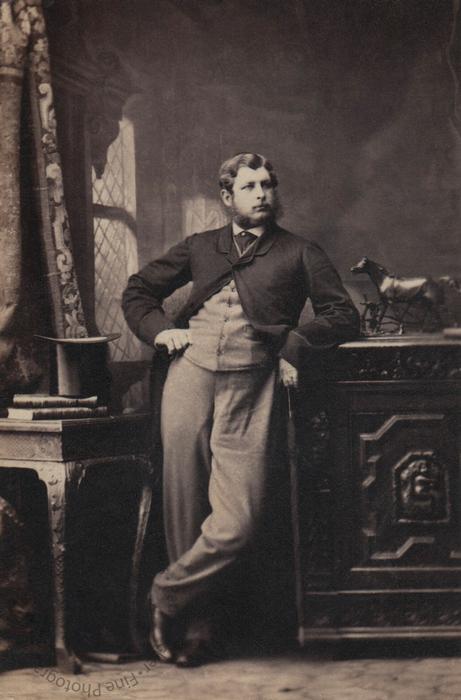Captain Edward Townshend
(1835-1885)
13 June 1862
Volume 7, page 122, sitting number 8735.
[Identified as ‘E. Townsend, Esq.’ in the Silvy daybooks and as ‘Captain Townshend’ on the album page, this is probably Captain Edward Townshend of the 46th Foot.]
Born on 23 November 1835 at Budworth in Cheshire, Edward Townshend was the son of Lee Porter Townshend of Wincham Hall and his wife Emma Johanna née Glegg.
He joined the Army as an Ensign (by purchase) on 28 April 1854. He served with the 46th Regiment of Foot during the Crimean War and was present at the battles of Alma, Balaklava and Inkerman, and at the siege and fall of Sebastopol. He became a Captain (by purchase) on 7 November 1862 and on 16 January 1863 he exchanged from the 46th to the 5th Fusiliers.
On 10 December 1867 ‘at Grappenhall Church Edward Townshend, Esq., late Captain 5th Fusiliers, son of Lee P. Townshend of Wincham Hall, Cheshire, [married] Alicia Jane, daughter of Thomas Parr, Esq., of Grappenhall Heys, in the same county’ (Cheshire Observer, 21 December 1867).
The couple appear on the 1871 census living at Parkfield House in Cheshire with their two-year-old son Edward Lee Townshend and five servants, including a footman.
When the 1881 census was taken ten years later, the family were living at Wincham Hall near Knutsford in Cheshire. Also present that night were their daughter Lillian, aged 8, a governess and seven servants, including a butler and a footman.
Captain Edward Townshend died, aged 49, at Wincham Hall on 23 February 1885. The cause of death was an accident while hunting.
FATAL ACCIDENT IN THE HUNTING FIELD – Captain Edward Townshend, of Wincham Hall, Cheshire, met with a fatal accident on Monday while hunting with the North Cheshire hounds. During a chase he attempted to clear what seemed an ordinary fence, but his horse’s leg got entangled in a wire which had not been seen, and the animal fell, and Captain Townshend was flung forward heavily on his head and rendered insensible. It was found that there was severe concussion of the brain. The unfortunate gentleman died without recovering consciousness’ (Reading Mercury, 28 February 1885).
According to the Cheshire Observer (28 February 1885), ‘Mr Townshend was conveyed home in an unconscious state, and received prompt medical attendance, but it was evident from the first that his injuries were of a severe nature, several of his ribs being broken and puncturing the lungs.’
He left an estate valued at £21,096.



